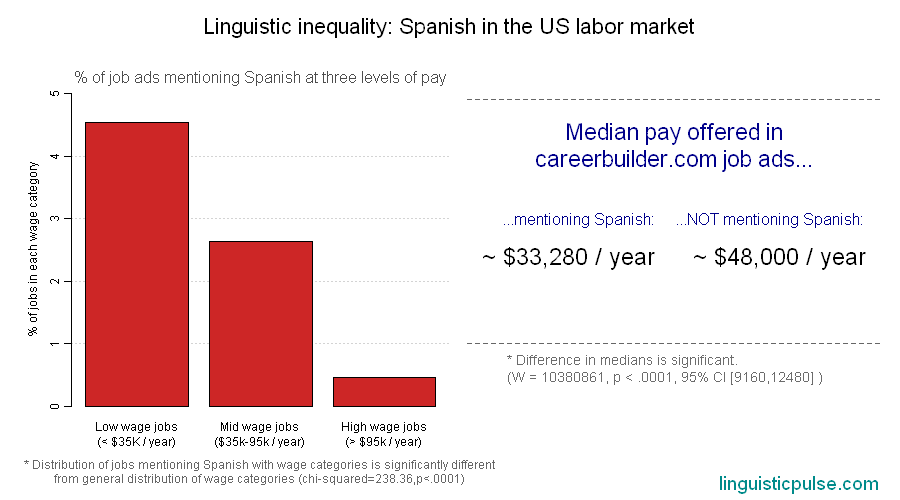Where are all the high-paying jobs for Spanish speakers?
They say learning another language increases your economic opportunities. They seem to be wrong.

A free daily email with the biggest news stories of the day – and the best features from TheWeek.com
You are now subscribed
Your newsletter sign-up was successful
If you've ever taken a language class, you've probably heard the promise that learning other languages is good for your economic future. The Modern Language Association (MLA) claims that language learning is important because "knowledge of a second language serves students well in the interconnected world: a second language opens the door to job opportunities in the global economy." That has the ring of truth to it. But it is most definitely not equally true for everyone and every language. Your dutiful memorization of Klingon phrases is not going to help you score that brass-ring job at a New York hedge fund.
But what about expertise in a major global language — particularly, the second most widely spoken language in the United States? Spanish is spoken by nearly 40 million people in the U.S., and it's the first language of nearly 400 million people worldwide. Surely, Spanish-English bilingualism should open doors of opportunity in the U.S. and global economies.
Not necessarily, according to a recent study I performed using data from careerbuilder.com. The results are summarized below. As you can see, nearly 5 percent of low-wage job ads mention Spanish. That number drops to roughly 3 percent for mid-wage jobs, and less than 1 percent for high-wage jobs. The implication is clear: There are job opportunities where speaking Spanish is a definite plus, but they are more prevalent at the lower end of the income spectrum. Jobs advertising pay of less than $35,000 per year mention Spanish approximately 10 times more frequently than ads offering more than $95,000.
The Week
Escape your echo chamber. Get the facts behind the news, plus analysis from multiple perspectives.

Sign up for The Week's Free Newsletters
From our morning news briefing to a weekly Good News Newsletter, get the best of The Week delivered directly to your inbox.
From our morning news briefing to a weekly Good News Newsletter, get the best of The Week delivered directly to your inbox.

The job market tends to treat bilingualism as an asset — but only for positions that are primarily focused on direct spoken contact with customers, particularly those customers who speak Spanish but not English. For example, the call center industry hires many Spanish-English bilinguals to make or answer calls, especially for large national corporations. Managers in these centers, especially along the U.S.-Mexico border, consider Spanish-English bilingualism an asset. But they do not necessarily offer greater compensation for it. Instead, according to a recent study of the industry, call centers tend to view Spanish-English bilingualism as a resource freely available in the borderlands area that they choose to locate in, not a learned or learnable skill. Similar observations can be made of positions in healthcare, where bilinguialism is a boon for people handling much of the direct patient communication. That means receptionists, medical technologists, and physician assistants — but not necessarily doctors and hospital administrators.
Indeed, there is a general perception that management jobs and positions requiring professional credentials have little need for direct spoken communication with the Spanish-speaking public. This is reflected in the infrequent mention of Spanish in job advertisements for higher-paying jobs. When a need for Spanish does arise, managers and highly paid professionals seem willing to rely on bilingual colleagues in lower-paid, lower-status positions to act as interpreters. For example, an English-speaking registered nurse or physician may rely on a bilingual medical assistant to communicate with Spanish-speaking patients.
But this misses some of the advantages of bilingualism in the management ranks. Even if direct spoken contact with customers and clients is not the primary responsibilities of managerial or professional positions, bilingualism may be advantageous for other reasons. For example, if you're a boss supervising employees who communicate with the public in Spanish, you'll be a better and more effective manager if you understand what they're saying.
Another common misperception involves the assumption that Spanish-English bilingualism is only valuable as a way of accommodating customers and clients who do not speak English. But there's more to it than that. Pew has estimated that 95 percent of Latino adults believe that maintenance of Spanish by U.S. Latinos is important. For some Americans of Latino descent, maybe that just means speaking Spanish privately in the home and with family. However, successes like the Spanish language television network Univision suggest that this desire to maintain Spanish may well be much bigger, and that there's profit to be found in media and other services in Spanish that are not strictly needed by bilinguals, but are nonetheless desired as a form of cultural or linguistic maintenance and promotion.
A free daily email with the biggest news stories of the day – and the best features from TheWeek.com
In the end, the MLA's statement might best be approached less as a description of the value of Spanish-English bilingualism in the U.S. labor market, where it seems that the language work that bilinguals do is not highly valued, but more as a recognition of how the basic facts about linguistic diversity should compel us to think more highly of the skills that bilinguals bring to the workplace.
-
 Why are election experts taking Trump’s midterm threats seriously?
Why are election experts taking Trump’s midterm threats seriously?IN THE SPOTLIGHT As the president muses about polling place deployments and a centralized electoral system aimed at one-party control, lawmakers are taking this administration at its word
-
 ‘Restaurateurs have become millionaires’
‘Restaurateurs have become millionaires’Instant Opinion Opinion, comment and editorials of the day
-
 Earth is rapidly approaching a ‘hothouse’ trajectory of warming
Earth is rapidly approaching a ‘hothouse’ trajectory of warmingThe explainer It may become impossible to fix
-
 The pros and cons of noncompete agreements
The pros and cons of noncompete agreementsThe Explainer The FTC wants to ban companies from binding their employees with noncompete agreements. Who would this benefit, and who would it hurt?
-
 What experts are saying about the economy's surprise contraction
What experts are saying about the economy's surprise contractionThe Explainer The sharpest opinions on the debate from around the web
-
 The death of cities was greatly exaggerated
The death of cities was greatly exaggeratedThe Explainer Why the pandemic predictions about urban flight were wrong
-
 The housing crisis is here
The housing crisis is hereThe Explainer As the pandemic takes its toll, renters face eviction even as buyers are bidding higher
-
 How to be an ally to marginalized coworkers
How to be an ally to marginalized coworkersThe Explainer Show up for your colleagues by showing that you see them and their struggles
-
 What the stock market knows
What the stock market knowsThe Explainer Publicly traded companies are going to wallop small businesses
-
 Can the government save small businesses?
Can the government save small businesses?The Explainer Many are fighting for a fair share of the coronavirus rescue package
-
 How the oil crash could turn into a much bigger economic shock
How the oil crash could turn into a much bigger economic shockThe Explainer This could be a huge problem for the entire economy